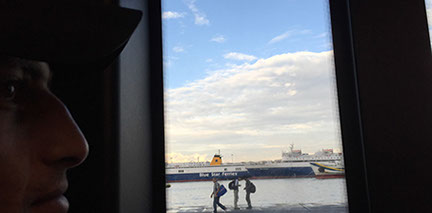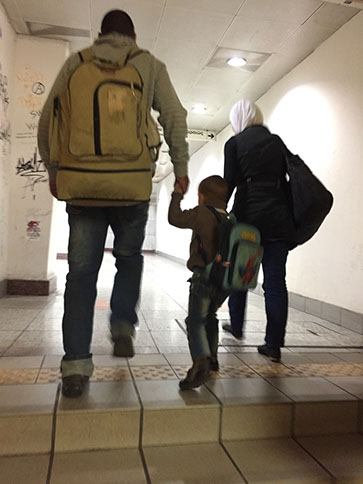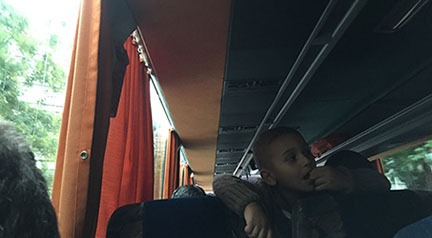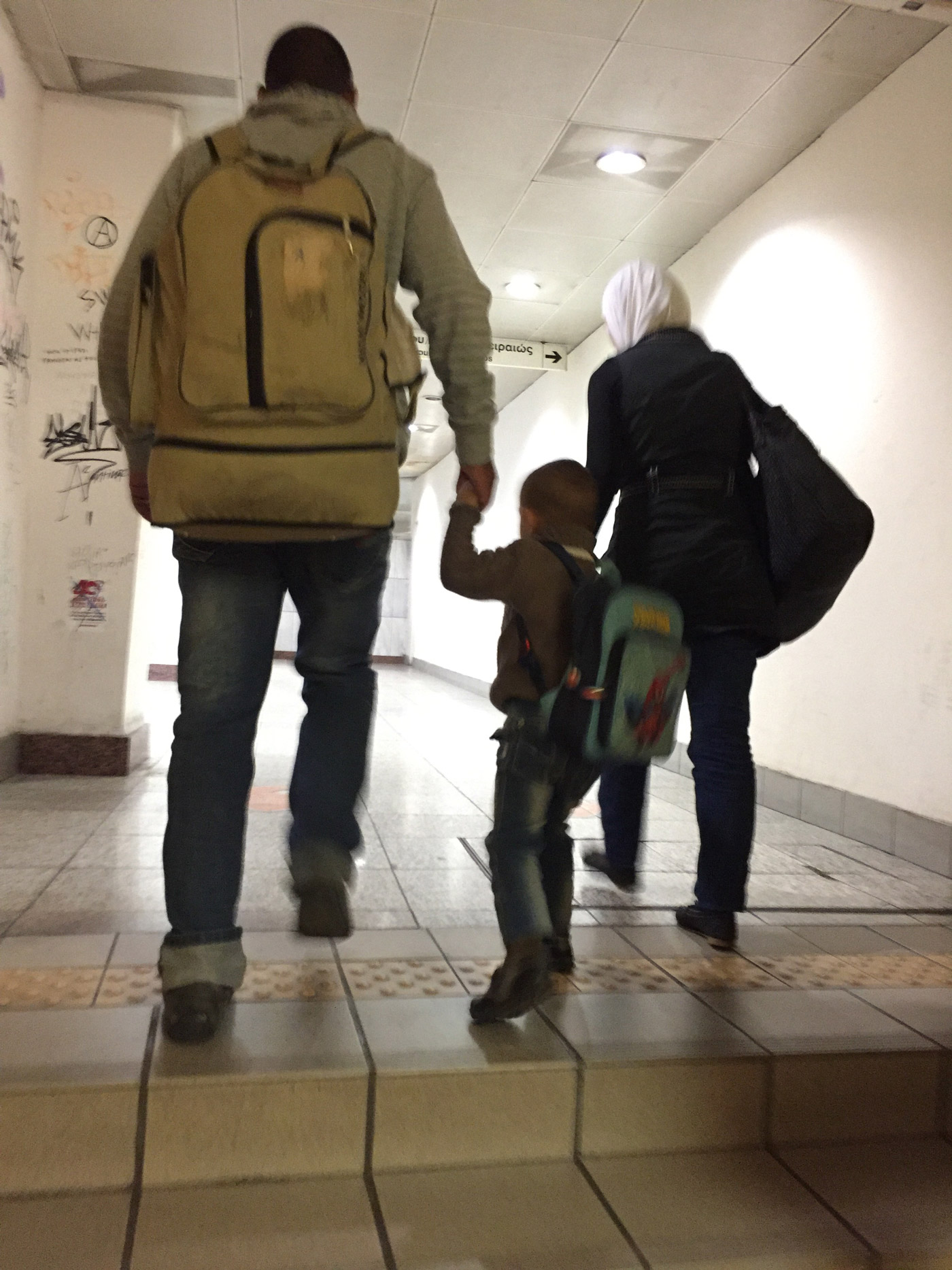Arabic lessons
On the way to Macedonia, a former soldier reluctantly reveals his name and teaches his mother tongue to me.
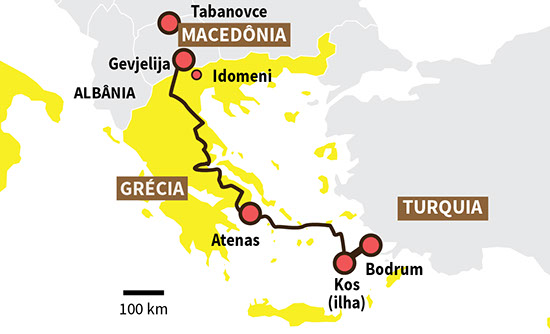
At 7:17 a.m. on Tuesday, Ghazi and Razan start folding the blankets that keep their children warm. The lights at the port of Athens are already visible. It's a cloudy and humid morning on the first day of autumn.
Ghazi dresses Tala in a turtleneck sweater, singing her a song as he straightens the sleeves. The girl is annoyed with the collar, but Ghazi insists, saying that she has to wear it because it's cold outside. The mother hands the daughter a brush, and then puts a pink tiara with flowers in her hair. Mohammad smiles as his mother dresses him up with brown sweater. He eats a banana for breakfast and frowns at the bruised end, which the mother promptly swallows for him.
Musa is anxious to talk with his family. Ever since he left Turkey for Greece, he hasn't managed to contact his relatives. As soon as he arrives at the port, he starts searching for a wi-fi hotspot. Musa finds a connection at the port, but it's a weak signal. He keeps trying, and finally gets a signal at the bus stop, on the way to the train station. Using WhatsApp, he makes a video call to his brother, who also left the country to escape ISIS. Smiling, he says that he has survived the crossing of the Aegean Sea and is now in Athens. When I ask about the conversation, he says that he cannot give any details.
“Daesh, Daesh!” he repeats, making that same throat-slitting gesture with the hand. He fears that they will find out his brother's whereabouts and cut his head off.
Following the advice of Syrians who are living in Greece, the group catches a train to the office of Oimo Travel, a travel agency which organizes refugee trips to the Macedonian border. On the window seat, Tala sings next to Musa, making up a composition of her own:
“Driver, where are we going, driver, where are you taking us, faster, faster, faster!”
On the way, a young, spiky-haired man from the group buys bandages to cover a tattoo on his left arm. It's a swastika. He says he didn't know what it meant when he got the tattoo, only that he liked the symbol and that he saw it on a film. Now that he dreams of making it to Germany, he doesn't want to run the risk of having trouble with the police. He will fake a wound and wear the bandages throughout the whole trip. The young man talks to me and loves taking selfies with the group, but he doesn't want to reveal his name. He says that he had been an Army soldier when the war broke out in 2011 and that he fled because he didn't want to take part in the massacre, a decision which made him a marked man. His family received a formal notice which declared him a dead man. He couldn't go home. Since then, he stopped talking with his family members, fearing that they might pay the price of his desertion. I ask if he witnessed many deaths while he was in the army.
“Yes, many deaths.”
And did he have to kill?
“I ran away before that.”
A fan of American films, he uses English expressions like a Hollywood actor, repeating the word "fucking" in every sentence. "I am fucking hungry." "Let's go to this fucking city."
Shortly before 10 a.m., we arrive at the travel agency, a street-level office with Greek letters on the front and Arabic posters inside. Once again, Ghazi gathers everyone's documents. The price is 40 euros per person, and business is done in the Arabic language. The bus to Macedonia should arrive in two hours. Everyone sits on the sidewalk. The waiting smells of the onion flavored Pringles that the kids eat and pass around.
To distract himself, the former soldier teaches me Arabic lessons. I take notes of the words I hear and repeat the phrases I learned, "Ana Leticia asme, Ana mean al Brazil, Ana sahafea" (My name is Leticia. I'm from Brazil. I'm a journalist.) They laugh at my accent, and I involuntarily become a source of amusement to the group as time goes by.
Shortly before noon, we learn that the bus is on the way. Ghazi checks to see if everyone is present, and finds out there is one person missing. Rama, an 18 year old girl, decided to take a walk and hasn´t returned yet. Anxiety looms over the group. She shows up a few minutes later and is scolded by the older ones. They warn her that the group must stick together. “This is no time for sightseeing,” they say. The atmosphere is tense.
We walk two blocks to a square where there is an Arab restaurant. It's the meeting point for the trip, and everyone feels at home. Dodging the Greek sign, they communicate in their own language with all the employees of the place. There, we meet again with other Syrians who were at the camp in Kos, like medical student Jafar Issa, 24, who was also born in Raqqa like most of the group. I ask him if he's happy.
“Not really, I just want to get going.” he says.
De Atenas, na Grécia, refugiados viajam para a Macedônia
He has a sorrowful look in his eyes and says he's not traveling by choice, but because there is no choice. . He doesn't like being called a refugee.
“They look at us as if we are nothing. In my country, I felt important. When I was in the university, I felt special. Now they look at us like that, as refugees. You can see Syrians smiling, they will smile at you. But inside, we feel the pain. We're not happy to be refugees,” he explains.
It's been 40 minutes since we have been informed that the bus would come, but the waiting continues. Ghazi is getting nervous. He considers the possibility of catching a train to Macedonia. The trip organizers say the bus is on the way, that It's coming and they just have to wait a little more. But as time passes, , the group begins to doubt the explanations. They keep looking down the street, waiting, afraid that something might cut their trip short.
At 1 p.m., the bus finally arrives.
“Yala umo, yala umo,” shouts 28-year old Assad, the uncle of the children on the mother's side, calling everyone to get ready.
In five minutes, all the 11 members of the group are already in their seats. But there are still three vacant seats on the bus, and it cannot continue the trip until all the seats are occupied. The waiting goes on.
Sitting in front of me, the former soldier who colors his sentences with the word "fucking" plays with Mohammad, smiling. Then, he tells me that he has a bullet lodged in his leg. And that he has"three Army stars." He carries the war in his body. And he doesn't want to talk about it. The ex-soldier says he has no feelings, that he doesn’t feel anything. Like everyone else, he wants to forget about the past. And study psychology in Germany. To pass the time, he goes back to my Arabic lessons, asking the questions he taught me on the sidewalk hours before: what is your name, how old are you, where are you from. We invert the game and I ask him his name in Arabic "Ma hwa Asmak?" Then he finally reveals his identity. The soldier with no feelings is called Ammar.
Darkness on the border
At 1:46 p.m., the bus leaves to a seven-hour journey to the Macedonian border. Most of the people in the group fall asleep, exhausted. Mohamed, the former marathon runner from Iraq, says he feels tired but can't get his eyes closed. First, he was nervous because of the crossing. Then, he was afraid someone would steal something from the tents. After that, the ship was rocking way too much. And right now, the passenger in the back seat won't stop talking. Plus, the passenger has a cellphone that keeps making bird sounds.
”It's been eight days since I had a good night of sleep. I wish I could be on a beach, having a cold drink.” he says.
Wide awake, he looks at the mountains through the window, foretelling a new path.
“They are so beautiful. I want to study nature.” he says, thinking about getting a degree in Geology in the future.
After a seven-hour trip, the bus is nearing the border with Macedonia. At 9:50 pm, Ghazi puts the shoes on the children, preparing them for the hike which is about to happen. At a 10 minute distance from the point of arrival, the border between Greece and Macedonia, an outcry can be heard inside the bus. One of the travelers doesn't have his documents. A new roll call is made amid heated arguments. The atmosphere is tense once again.
Shortly after 10:00 pm, the bus pulls over to a dark shoulder. The tour reaches the first boundary. Everyone steps out of the bus in an apprehensive mood. A few weeks before, Macedonian security forces had fired grenades and tear gas to disperse migrants. The confrontation happened shortly after the country had declared state of emergency following the massive influx of refugees.
The uncertainty about what awaits the group on this night tenses up the beginning of the journey, paced by the sound of steps on the gravel underneath the tracks.
